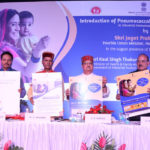“Significant decline in low infant birth weight since 2017 in India”
New Delhi, November 26, 2018:
A recent study of about 8,000 Indian women who gave birth between 2004 and 2005 and 2011 and 2012 (India Human Development Survey) has revealed a strong association between adverse birth outcomes and sanitation access, gender-based harassment and physical labor. Spending than two hours per day fetching water was associated with low birth weight. Open defecation or sharing a toilet within the building was associated with greater chances of low birth weight or preterm birth.
Several homes in low-income countries do not have private toilet facilities or a private drinking water source. Women and girls have to thus bear the added burden of fetching water from outside, often walking to longer distances. All this can be physically stressful and lead to low birth infants in expectant mothers.
Speaking about this, Padma Shri Awardee, Dr KK Aggarwal, President, HCFI, said, “Infections, lack of oxygen to fetus in the womb and new born baby, premature deliveries, delivery complications, and birth defects are some of the factors that can cause newborn deaths. It is important to raise awareness about the need for adequate and exclusive care for the expectant mother before delivery; and for both the mother and the new born after delivery to improve the chances of survival. Proven high-impact interventions and quality care for small and sick newborns around the time of birth may help in preventing about 80% of newborn deaths. Proper and timely vaccinations are very important.”
Postnatal care can help in checking for and averting any danger signs such as insufficient feeding, fast breathing (a breathing rate of more than 60 per minute), severe chest in drawing, lethargy, fever, low body temperature, or jaundice.
Adding further, Dr Aggarwal, who is also the Group Editor-in-Chief of IJCP, said, “India saw seen a significant decline of 8% in the number of infant deaths in 2017. This has largely been the result of countrywide efforts to expand health services coverage, including reproductive, maternal and newborn health services. However, there is a still a long way to go in terms of expanding the reach of such efforts into the remote areas and ensuring access to postnatal healthcare to mothers and newborns there.”
Some tips to handle a newborn from HCFI
- Wash your hands with soap or use a hand sanitizer before handling the baby.
- Be careful to support the baby’s head and neck.
- Start breastfeeding within an hour of birth.
- Ensure that the baby is exclusively breastfed for the first 6 months.
- Child should be fed on demand or at least 8 times in 24 hours.
- Avoid feeding honey, water or things other than breast milk in lieu of a ritual as it can be a source of infection to a baby.
- Give the baby a sponge bath until the umbilical cord falls off and the navel heals completely (1-4 weeks).
- Kangaroo Mother Care especially for low birth weight infants, wherein the baby is held in a special way stuck with the chest to provide skin to skin contact with the mother along with exclusive and frequent breastfeeding







